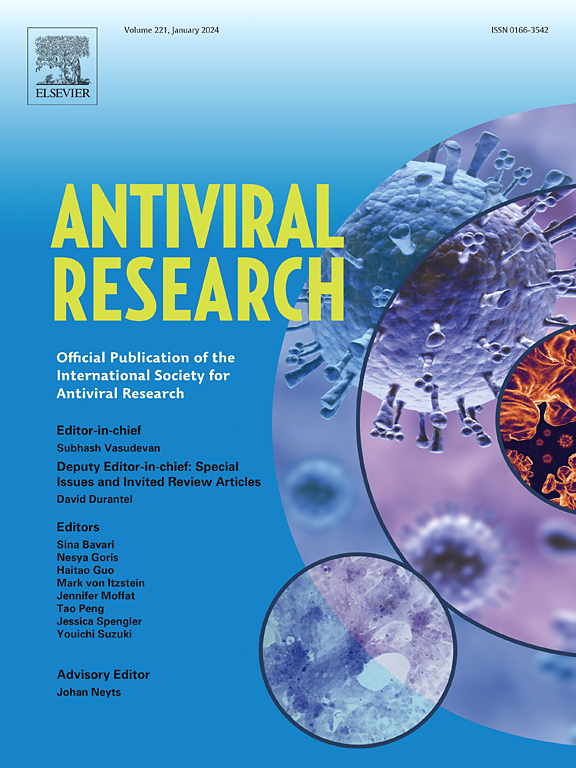Mode of antiviral action of the galactose-specific lectin, AJLec, on the Junin virus propagation
IF 4
2区 医学
Q1 PHARMACOLOGY & PHARMACY
引用次数: 0
Abstract
Junin virus (JUNV), a member of Arenaviridae, is the causative agent of Argentine hemorrhagic fever (AHF). Available AHF treatments are limited; therefore, development of effective and safe treatments is required. Thus, in this study, novel lectins were examined for anti-JUNV activity. To evaluate JUNV propagation, a recombinant Junin virus vaccine strain (r3Candid #1/ZsGreen) containing the ZsGreen gene as a marker in the viral genome was used. The anti-JUNV effects of four types of marine organism-derived lectins collected in Japan, including the Nagasaki Prefecture, were examined. AJLec, which was extracted from the Sea Anemone Anthopleura japonica, reduced the number of infected cells and viral production. Infection and infection-surrogate assays revealed that incubation of AJLec with viruses and cells before infection, and maintaining it during infection, was required to exhibit full antiviral activity. Moreover, the anti-JUNV activity of AJLec was suppressed by the addition of lactose; hence, the anti-JUNV activity of AJLec was a result of its galactose recognition. This indicates the importance of galactose on the surface of the Junin virion and the cell membrane for entry into cells. Overall, these results provide new insights into the anti-JUNV activity of AJLec. Particularly, the potential of lectins as new antiviral agents that inhibit pathogenic arenavirus replication and propagation is promising.
半乳糖特异性凝集素AJLec对Junin病毒繁殖的抗病毒作用模式
朱宁病毒(JUNV)是阿根廷出血热(AHF)的病原体,属沙粒病毒科。可用的AHF治疗是有限的;因此,需要开发有效和安全的治疗方法。因此,在本研究中,研究了新型凝集素的抗junv活性。为了评估JUNV的繁殖,我们使用了含有ZsGreen基因作为病毒基因组标记的重组Junin病毒疫苗株(r3Candid #1/ZsGreen)。研究了在日本(包括长崎县)收集的四种海洋生物来源的凝集素的抗junv作用。从海葵Anthopleura japonica中提取的AJLec可以减少感染细胞的数量和病毒的产生。感染和替代感染试验显示,AJLec在感染前与病毒和细胞孵育,并在感染期间维持,才能表现出充分的抗病毒活性。此外,添加乳糖可抑制AJLec的抗junv活性;因此,AJLec的抗junv活性是其半乳糖识别的结果。这表明半乳糖在Junin病毒粒子表面和细胞膜上对于进入细胞的重要性。总的来说,这些结果为AJLec的抗junv活性提供了新的见解。特别是,凝集素作为抑制致病性沙粒病毒复制和繁殖的新型抗病毒药物的潜力是有希望的。
本文章由计算机程序翻译,如有差异,请以英文原文为准。
求助全文
约1分钟内获得全文
求助全文
来源期刊

Antiviral research
医学-病毒学
CiteScore
17.10
自引率
3.90%
发文量
157
审稿时长
34 days
期刊介绍:
Antiviral Research is a journal that focuses on various aspects of controlling viral infections in both humans and animals. It is a platform for publishing research reports, short communications, review articles, and commentaries. The journal covers a wide range of topics including antiviral drugs, antibodies, and host-response modifiers. These topics encompass their synthesis, in vitro and in vivo testing, as well as mechanisms of action. Additionally, the journal also publishes studies on the development of new or improved vaccines against viral infections in humans. It delves into assessing the safety of drugs and vaccines, tracking the evolution of drug or vaccine-resistant viruses, and developing effective countermeasures. Another area of interest includes the identification and validation of new drug targets. The journal further explores laboratory animal models of viral diseases, investigates the pathogenesis of viral diseases, and examines the mechanisms by which viruses avoid host immune responses.
 求助内容:
求助内容: 应助结果提醒方式:
应助结果提醒方式:


